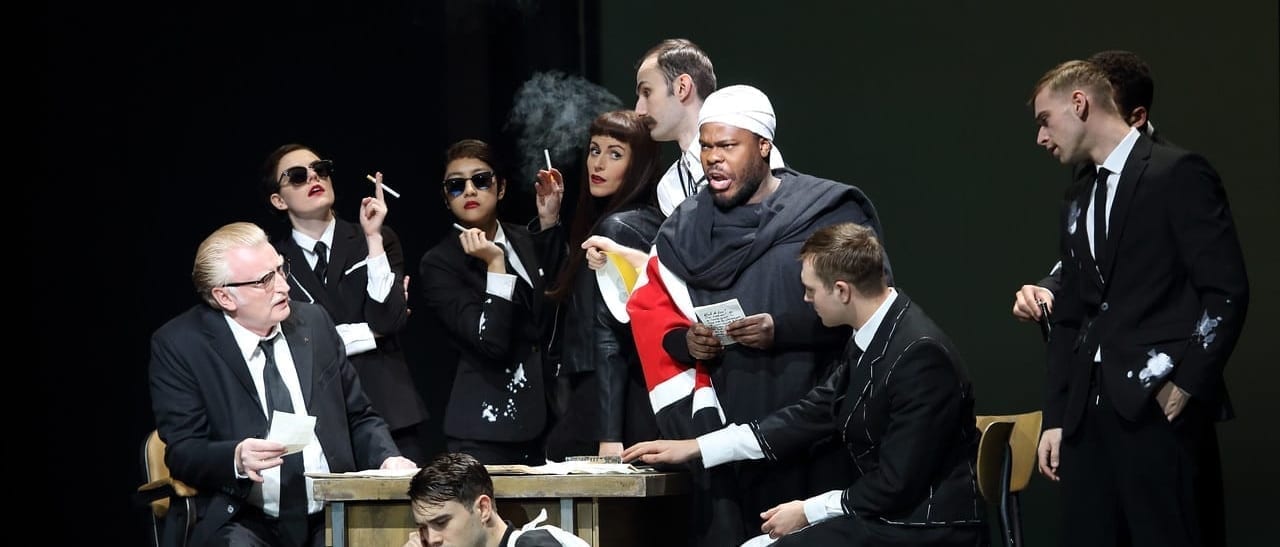‘Mirrors are the doors by which Death comes and goes’. A neat and profoundly stark metaphor on the ephemeral human condition, Jean Cocteau’s Orpheus (1950) confronts our perceptions of vanity, sacrifice and time through celluloid stills. Intentionally unsettling, this Surrealist cult-classic has lent itself to Philip Glass’ chamber opera of the same name. Written in 1991 and premiered in 1993, Glass adapts Cocteau’s subverted narrative of the fated Greek myth in a two-act opera. Paradigm of the French technique ‘mise en abyme’; anglicised as ‘mirror of a mirror’, the work encourages a meta sense of awareness. Much like Cocteau’s interpretation, Glass’ has been subject to similar ambivalence. However, under the thought-provoking direction of Netia Jones and authentically translated text by Emma Jenkins, the English National Opera successfully incorporate both the nostalgia of cinematic reel and the futurism of mechanical autonomy.
We begin in a bustling Parisian cafe. Under the attentive baton of Geoffrey Paterson, the ENO’s orchestra underscore an admittedly hectic scene. Simon Shibambu plays the established Poet, revealing to us that The Princess (Jennifer France) has taken the poetic teenage heartthrob, Cégeste, (Anthony Gregory), under her wing. Once it’s revealed that he is the favoured journalist for the magazine Nudism — which she is patreon of, at a loss for creative impetus, Orphée burns with jealousy. However, destiny crudely intervenes, with Cégeste’s abrupt death. Whilst waiters, gossipers and businessmen are clad in monochrome, the hazy fumes of their chain smoking emanates from Glass’ score. Reputed as a ‘Minimalist’ composer; albeit to his own disdain, Glass’ music should be recognised as colour that accentuates onstage drama. With the ongoing success of Akhnaten, which toured at the ENO earlier this year, Glass’ writing carves scenes. We are no longer in the luxuriant, melodic soundscape of a Puccini opera. This is music relentlessly mechanical.
Video design; particularly pre-recorded tape is a seminal component to this production. Unlike the convention of a draped velvet curtain façade, Lizzie Clachan sought for an exposed stage — even before the production began. Notably, the stage is littered with scenes of the film. Without being familiar with it, this production may be a little daunting. We are confronted with a video of Jean Cocteau, though what he’s saying is intentionally tampered with. Behind this incongruous television screen, Paul Nappier-Burrows’ literally embodies the man, whilst a boxer fights without an opponent. Lighting designer Lucy Carter projects a chalk-marked numerical grid against a black backdrop. Metal frames glide across the stage. From the get-go, this production proposes ambiguity.
Baritone Nicholas Lester excels in the work’s title role. Rejected from the bohemian sphere of poets, plucked as an accomplice to The Princess and subsequently a pawn in her convoluted game, Lester’s portrayal of Orphée was dynamic. Glass’ writing calls for moments of declamatory outburst, to which the capable baritone executed with ease. Whilst the radio transmission signals, sent by The Princess, serve as intentionally indecipherable, the baritone’s diction was clearly projected. Alongside him, soprano Sarah Tynan’s Eurydice made for an equal match. Despite the pair’s dysfunctional relationship unraveling as the narrative did, Tynan’s ease with fluctuating register effectively mirrored the distress her character experiences. Dolled up as a 1950’s housewife; complete with rose-printed apron and carefully plaited hair, Jones’ costume design took a page out of the now-notorious magazine, Housekeeping Weekly. Confining Eurydice to the domesticity of the marital home was a telling comment on outdated gender roles. Moreover, tenor Nicky Spence as the steadfast Heurtebise was powerful. Comfortable amid the extensive register the role demands, Spence maintained a rounded, rich tone, even in moments of heavy pathos.
However, the night’s most striking performance was Jennifer France as The Princess. Alluring in vocal artistry as well as adept as an actor, France’s performance of The Princess was effortless. Stalking across the stage in patent stilettos, this femme fatale was acutely attentive to performance direction. Dynamic and tonal demands were met hand-in-glove, with France’s pianissimi notably her defining skill.
This production also utilises dance as a means of depicting turmoil. Danielle Agami’s choreography often distracted from the music, but during moments of little on-stage happening, the scenes akin to French tableau worked tastefully.
The work’s climax is symbolic of Cocteau’s intention. When Orphée exclaims ‘I cannot live with my nose pressed up against a wall’ after Heurtebise’s warning not to glance at his wife, the need for liberation, be it artistic or heuristic, is at the heart of the work. Cocteau’s legacy, be it through film, poetry, art or philosophy, revolves around confronting what we’re afraid of. And if that’s to end in dismay, then so be it.

